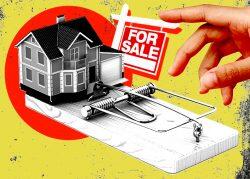Bidding wars for rentals are not new to New York City, where they have been increasingly common in recent months. But now other cities are seeing similar surges in competitions once left to home sales.
Agents in cities including Chicago and Atlanta have seen an unprecedented volume of offers above asking rents, the Wall Street Journal reported. This has led to bidding wars as prospective tenants try to secure leases.
Record home prices, low inventory and surging mortgage rates have led many to turn to rentals instead of buying. The result has shocked folks who didn’t know about offering to pay more than the listed price for rental properties.
“We didn’t even know you could do that,” one renter in Northern Virginia told the Journal.
There have been other carryovers from the housing market, such as emotional appeals in the form of letters and soliciting recommendations from previous landlords. (Some areas have discouraged or banned so-called “love letters” because it can lead to housing discrimination.)
Read more



Bidding wars are leading to higher rents and creating a market for digital tools. In Chicago, landlords have been using Brixbid to facilitate competition for rentals. According to the website’s founder, some apartments on the site have rented for 15 percent more than the asking price.
Bidding wars have also become normal in the Sun Belt. Rentals in the region’s suburbs are being leased for as much as 35 percent above ask.
The competition is having a profound effect on the rental market. Last month, the national median rent topped $2,000 for the first time, according to Redfin. May’s $2,002 median rent marked a 2 percent gain from April and a 15 percent year-over-year increase.
People deciding whether to rent or buy are getting mixed messages. National rent is at a record high and bidding wars are increasing, but home prices remain elevated. An analysis by John Burns Real Estate Consulting found that owning a home in April cost $839 more per month than renting, up from a negligible difference a year before.
The cost differential between owning and renting is nearly $200 greater than at any point this century.
[WSJ] — Holden Walter-Warner
